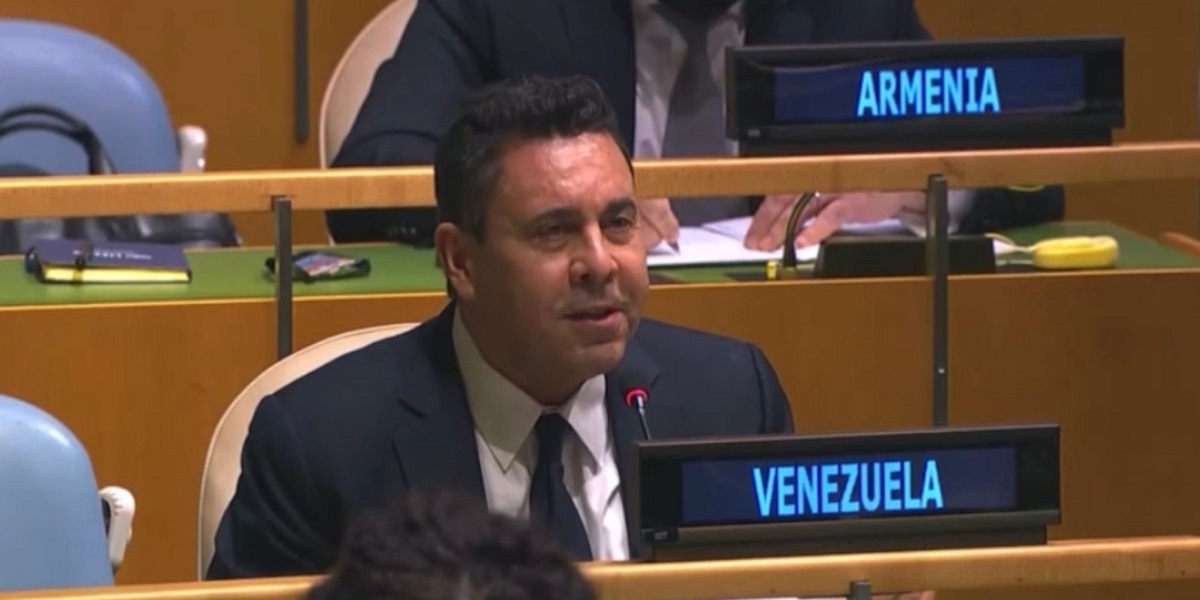During the discussion of Item 135 of the General Assembly Agenda, entitled The Responsibility to Protect and Prevention of Genocide, War Crimes, Ethnic Purification and Crimes Against Humanity, the ambassador of the Bolivarian Republic of Venezuela Before the United Nations, Samuel Moncada, stated that he will not accompany the draft resolution contained in document A / 75 / L.82 and rejected the inclusion of the topic on the General Assembly’s agenda.
The permanent representative, Samuel Moncada, reiterated the complaint about the instrumentalization and selective use of the Responsibility to Protect as an instrument of colonial intervention, which has resulted in the suffering, death and destruction of countries subjected to false protection, such as the case of Libya in 2011.
“The same powers that promised the salvation of nations and ended in their destruction are those that today, with the same discourse, threaten the independence and territorial integrity of Venezuela. With the same humanitarian narrative they threaten armed force to destroy the peace of our nation. The clearest aggression occurred in February 2019, when they tried, from the border with Colombia, to fabricate a military conflict using as an excuse, a false humanitarian operation. This precedent, so dangerous for the peace of the region, and for humanitarian operations around the world, was recognized by the US government agency, USAID, when in April of this year 2021 it indicated that it was actually a military operation to impose the policy of maximum pressure against our country. We are in the presence of the perversion of humanitarianism to achieve imperial ends. It is colonial aggression with a humanitarian discourse”, said Ambassador Moncada.
The Venezuelan diplomat explained the recent crimes against humanity that the Palestinian people have suffered; He stressed that military powers that promote the responsibility to protect do not feel the same obligation when Israel, the occupying power, perpetrates war crimes and ethnic cleansing against Palestine.
Along the same lines, Ambassador Moncada denounced that:
“in Colombia President Duque attacks the civilian population as if it were a military enemy. Dozens of peaceful protesters are assassinated in the cities, hundreds of social, community, indigenous, political and human rights leaders are systematically assassinated, massacres are counted by dozens and the disappeared by thousands. We have never seen interventionist powers speak of Colombia in the context of the Responsibility to Protect. The United States already has several military bases in that country but they do not serve to protect Colombians but their government. The Colombian people are alone in the fight for their human rights”.
Rejection to the application of unilateral coercive measures
During the meeting on The Responsibility to Protect and the Prevention of Genocide, War Crimes, Ethnic Purification and Crimes Against Humanity, Ambassador Samuel Moncada, denounced the imposition of unilateral coercive measures by the European and American military powers who seek to dominate sovereign nations through hunger and disease amid the Covid-19 pandemic.
“Unilateral coercive measures are acts of economic aggression that violate the human rights of hundreds of millions of people in more than 29 member countries of the United Nations. The first responsibility to protect consists on stopping the use of the economy as a weapon of mass destruction against the peoples”, he emphasized.
Venezuela expressed its commitment to the respect, promotion and protection of all human rights, fundamental freedoms and rejected the commission of crimes against humanity and war crimes, as well as genocide and ethnic cleansing, while reiterating the central role of the State as guarantor of the security for its population at all times.
“To conclude, we call on all member states to respect and apply in a comprehensive manner the Charter of the United Nations, which is the best legal instrument created by humanity to defend the peace, independence and human rights of our peoples”, he said.



